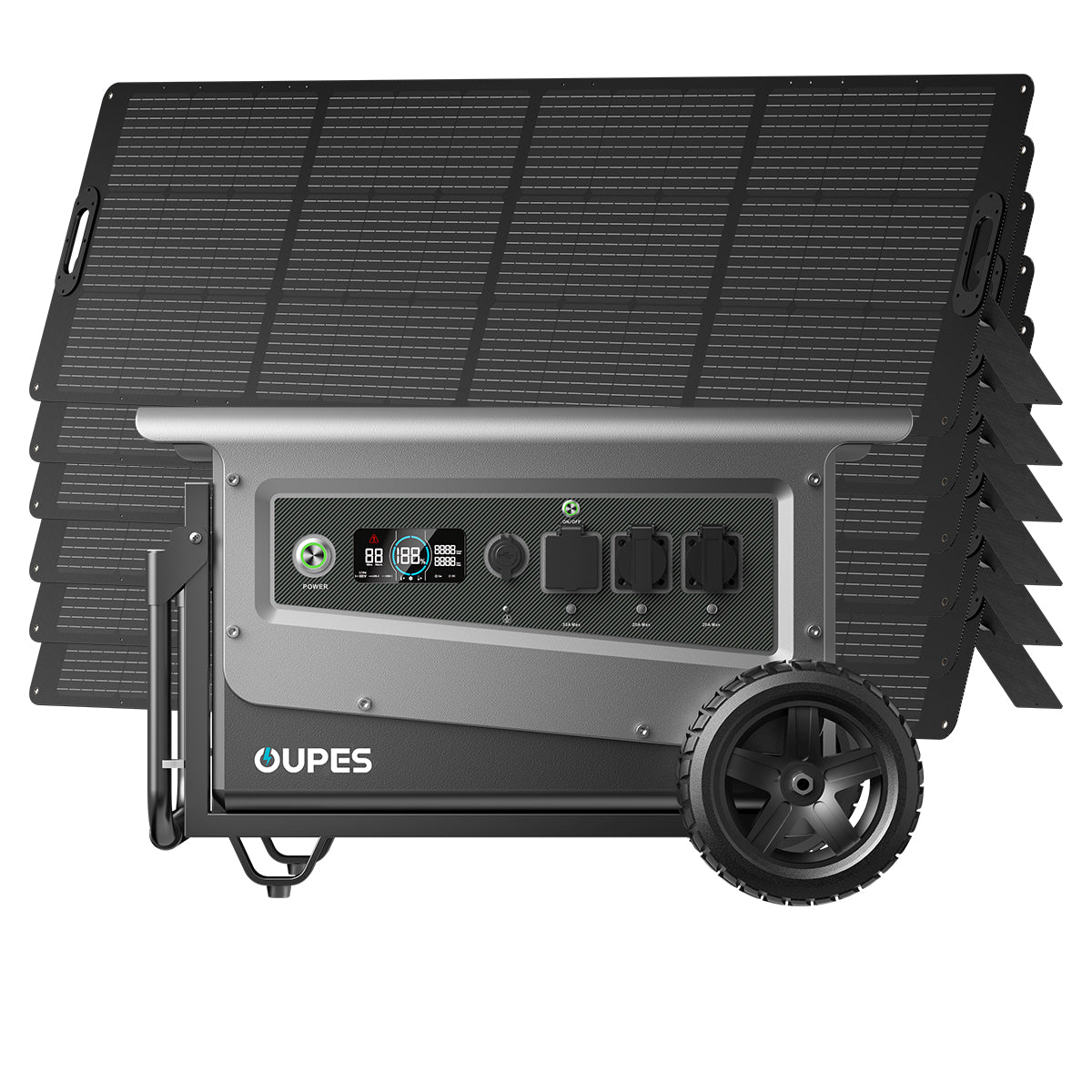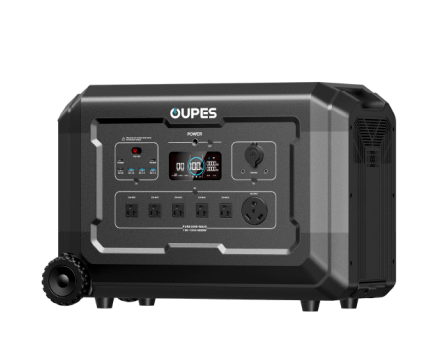
Introduction: Why Power Outages Happen
Power outages can strike at any time — whether from storms, grid failures, or natural disasters. In recent years, extreme weather events, heatwaves, and infrastructure strain have made outages more common across many regions. While short blackouts are inconvenient, extended outages can disrupt communication, spoil food, and compromise safety — especially if you rely on electricity for heating, medical devices, or remote work.
That’s why it’s essential to plan ahead and know exactly what to do before, during, and after a power outage — including how to use clean, portable energy sources like solar generators and portable power stations.
Immediate Steps to Take When the Power Goes Out
1. Check Your Surroundings
First, determine whether the outage affects just your home or the entire neighborhood. Look outside for streetlights or ask neighbors. If only your home is affected, inspect your circuit breaker for tripped switches.
2. Turn Off Sensitive Electronics
Unplug sensitive electronics like TVs, computers, and routers to avoid damage from power surges when electricity returns. Keep one light switched on to know when the power is restored.
3. Preserve Refrigerator and Freezer Coldness
Avoid opening fridge or freezer doors unnecessarily. A closed refrigerator keeps food cold for about 4 hours; a full freezer can maintain safe temperatures for up to 48 hours.
4. Use Alternative Lighting Safely
Rely on battery-powered flashlights, solar lamps, or LED lanterns. Avoid candles whenever possible — they pose a fire risk, especially during emergencies.
5. Stay Informed
Use a battery-powered or solar-powered radio to receive local emergency updates. If cell service remains available, monitor outage maps or weather alerts.
How to Prepare Before an Outage
Preparation is key to handling any power loss efficiently. You can minimize disruption by creating a home energy backup plan.
1. Create an Emergency Supply Kit
Your kit should include:
- Flashlights and spare batteries
- Non-perishable food and bottled water (3 days minimum)
- First-aid supplies and medications
- Portable chargers and power banks
- Blankets or sleeping bags for warmth
- A solar generator or portable power station
2. Identify Essential Devices
List which devices you need to power during an outage, such as:
- Phones and communication tools
- CPAP machines or medical devices
- Refrigerators and small kitchen appliances
- Wi-Fi routers, laptops, and lighting
3. Test Your Backup Power Source
If you own a solar generator or portable power station, test it periodically to ensure it’s fully functional and properly charged.
Backup Power Options: Generators vs. Solar Generators
When preparing for power outages, you’ll often need a backup power source. The two main types are gas-powered generators and solar-powered generators. Each has advantages, but modern solar generators offer cleaner, quieter, and safer operation for residential use.
| Feature | Gas Generator | Solar Generator |
|---|---|---|
| Energy Source | Gasoline or propane | Solar energy and battery storage |
| Operation Noise | Very loud (60–90 dB) | Silent operation |
| Maintenance | Requires oil changes and fuel refills | Low maintenance, plug-and-play |
| Indoor Safety | Emits carbon monoxide, outdoor use only | No emissions, safe indoors |
| Environmental Impact | High CO₂ emissions | 100% renewable and eco-friendly |
| Lifespan | 3–5 years (depending on maintenance) | Up to 10 years (LiFePO₄ batteries) |
How to Use a Portable Solar Generator During a Power Outage
A portable solar generator or power station is an all-in-one backup power solution combining solar charging, battery storage, and multiple output ports. Here’s how to make the most of it during an outage.
1. Charge in Advance
Keep your unit charged from solar panels, AC wall power, or car outlets before an outage occurs. A fully charged power station ensures immediate readiness.
2. Prioritize Critical Devices
Power only what’s essential — communication devices, lighting, and medical or refrigeration needs. Avoid overloading by checking wattage limits.
3. Use Efficient Appliances
LED lighting and energy-efficient electronics extend your available power. For example, a 1000Wh power station can run a 10W LED light for about 80–90 hours.
4. Replenish with Solar Energy
During daylight hours, use solar panels to recharge your power station. Even partial sunlight helps maintain battery levels for extended blackouts.
Essential Safety Tips During Power Outages
- Stay indoors during storms and avoid downed power lines.
- Conserve energy by switching off unnecessary lights or appliances.
- Check on neighbors, especially elderly or disabled individuals.
- Never use gas stoves or charcoal grills indoors for heating or cooking.
- Maintain ventilation if using fuel-powered devices outdoors.
Long-Term Strategies for Energy Independence
Frequent outages often indicate it’s time to consider long-term solutions. Investing in solar power and energy storage can make your home more resilient, reduce costs, and ensure uninterrupted electricity.
1. Home Solar + Battery Setup
A rooftop solar array combined with a home battery can power your household through multi-day outages, cutting dependence on the grid.
2. Portable Power Systems for Flexibility
If you live in an apartment or rent your home, portable solar generators provide an excellent alternative. They can power small appliances during blackouts and travel with you on outdoor adventures.
3. Regular Preparedness Drills
Practice connecting and operating your backup systems to ensure a smooth transition during real outages. Keep solar panels accessible and cables neatly stored for quick deployment.
Comparison Table: Gas Generator vs. Solar Generator
Here’s a quick summary comparing both options for emergency use:
| Criteria | Gas Generator | Solar Generator |
|---|---|---|
| Setup Time | 5–10 minutes, fuel required | Instant, plug-and-play |
| Indoor Use | Unsafe | Safe |
| Power Duration | Depends on fuel supply | Rechargeable via sunlight |
| Noise Level | High (60–90 dB) | Silent |
| Maintenance Cost | High | Low |
| Environmental Impact | Pollution and emissions | Eco-friendly |
How OUPES Portable Power Stations Can Help
OUPES portable power stations are designed for modern households seeking reliable, emission-free backup energy. Each unit uses advanced LiFePO₄ batteries with over 3,500 charge cycles, fast charging (AC + solar), and built-in smart monitoring via the OUPES app.
During an outage, OUPES systems can power essential devices like lights, routers, refrigerators, and medical equipment — all without noise or fumes. Compact yet powerful, they make emergency energy both practical and sustainable.
FAQ
1) How long can a solar generator power my home?
It depends on capacity and appliance load. A 2000Wh station can run essentials like lighting, routers, and small fridges for 8–12 hours. With solar recharging, it can last indefinitely.
2) Should I unplug my appliances during an outage?
Yes. Sudden surges when power returns can damage sensitive devices. Keep one light plugged in to know when power is restored.
3) Can solar generators work on cloudy days?
Yes. Although efficiency drops, panels still generate energy in overcast conditions — enough to maintain small devices or trickle-charge batteries.
4) What’s the difference between a solar generator and a portable power station?
A solar generator typically refers to a portable power station combined with solar panels. The power station stores energy; the panels recharge it using sunlight.
5) Why choose OUPES?
OUPES offers reliable, eco-friendly power solutions featuring long-life LiFePO₄ batteries, fast charging, and user-friendly app control — making them ideal for emergencies and everyday backup.
Final Thoughts
Power outages can happen anytime — but they don’t have to leave you helpless. By preparing in advance and investing in reliable solar or portable power systems, you can maintain light, communication, and comfort even when the grid fails. Clean, quiet, and dependable solutions like solar generators are reshaping how we handle emergencies — turning unpredictable outages into manageable, temporary inconveniences.




























